1000 Girls, 1000 Futures: New York Academy of Sciences’ Mentoring Initiative
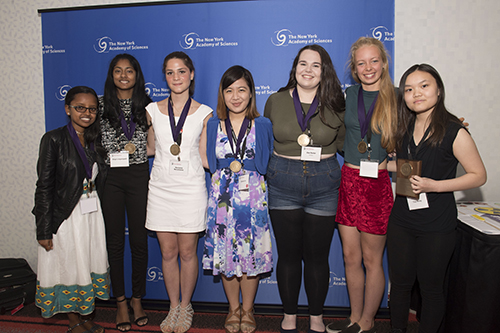
Photo courtesy of NYAS
From left: Tsion Tesfu Abebe, Sriya Lingampalli, Marianna Nerantzinis, Sharon Lin, Zoe Porter, Hannah Strang, and Tina Wong participate in 1000 Girls, 1000 Futures as mentees.
Program Mentors
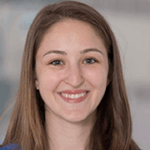 Jessica Lavery is a research biostatistician at the Center for Health Policy and Outcomes at Memorial Sloan Kettering Cancer Center in New York. She has an undergraduate degree in statistics from Loyola University and a master’s degree in biostatistics from The University of North Carolina at Chapel Hill. This is her first year as a mentor in the 1000 Girls, 1000 Futures program.
Jessica Lavery is a research biostatistician at the Center for Health Policy and Outcomes at Memorial Sloan Kettering Cancer Center in New York. She has an undergraduate degree in statistics from Loyola University and a master’s degree in biostatistics from The University of North Carolina at Chapel Hill. This is her first year as a mentor in the 1000 Girls, 1000 Futures program.
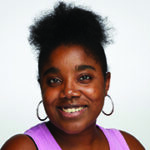 Jasmine Williams is an informatics consultant at ActiveHealth Management in New York. She has an undergraduate degree in mathematics from CUNY Hunter College and a master’s degree in biostatistics from Columbia University. She is a strong advocate for diversity and inclusion in STEM. This is her first year as a mentor in the 1000 Girls, 1000 Futures program.
Jasmine Williams is an informatics consultant at ActiveHealth Management in New York. She has an undergraduate degree in mathematics from CUNY Hunter College and a master’s degree in biostatistics from Columbia University. She is a strong advocate for diversity and inclusion in STEM. This is her first year as a mentor in the 1000 Girls, 1000 Futures program.
Program Manager
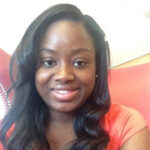 Martika Parkinson is the program manager of the 1000 Girls, 1000 Futures program at the New York Academy of Sciences in New York City. She has an undergraduate degree in psychology from Kean University and is pursuing a master’s in educational technology at Ramapo College. Through the New York Academy of Sciences’ Global STEM Alliance, Parkinson’s focus is on retaining more students in the STEM pipeline and inspiring the next generation of STEM leaders.
Martika Parkinson is the program manager of the 1000 Girls, 1000 Futures program at the New York Academy of Sciences in New York City. She has an undergraduate degree in psychology from Kean University and is pursuing a master’s in educational technology at Ramapo College. Through the New York Academy of Sciences’ Global STEM Alliance, Parkinson’s focus is on retaining more students in the STEM pipeline and inspiring the next generation of STEM leaders.
Program Mentees
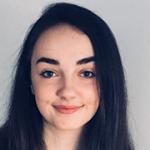 Emma Neillie is a first-year mentee in the 1000 Girls, 1000 Futures program. She is 15 years old and lives in Scotland. She developed an interest in STEM at the age of about 10 and has participated in many events and programs relating to STEM. She also likes to spend time on music—she plays violin and piano and sings—sports such as netball, and volunteering in her community.
Emma Neillie is a first-year mentee in the 1000 Girls, 1000 Futures program. She is 15 years old and lives in Scotland. She developed an interest in STEM at the age of about 10 and has participated in many events and programs relating to STEM. She also likes to spend time on music—she plays violin and piano and sings—sports such as netball, and volunteering in her community.
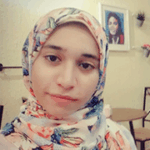 Asmaa Ibrahim is a 17-year-old from Egypt. She is in grade 11 in a secondary official language school in Suez City. She has a strong interest in engineering and mathematics. Her ambition is to pursue a career in architecture. This is her first year as a mentee in the 1000 Girls, 1000 Futures program.
Asmaa Ibrahim is a 17-year-old from Egypt. She is in grade 11 in a secondary official language school in Suez City. She has a strong interest in engineering and mathematics. Her ambition is to pursue a career in architecture. This is her first year as a mentee in the 1000 Girls, 1000 Futures program.
How to Get Involved
The academy is looking for role models to make a difference in the lives of young women. Mentoring in the 1000 Girls program requires a commitment of three hours per month and can be done anywhere, as all activities take place online. Female STEM mentors work with mentees on 21st-century skills such as communication, leadership, and college readiness. Applications for both mentors and mentees can be found at the NYAS website. Applicants will be selected by January 14, 2019, and the program will run from February through October of 2019.
1000 Girls, 1000 Futures, launched by the New York Academy of Sciences’ Global STEM Alliance (GSA) in 2015, encourages women ages 13–18 interested in science, technology, engineering, and math (STEM) to advance their pursuit of STEM careers through skill development and mentoring. The mission of 1000 Girls, 1000 Futures is to create a supportive female global network to inspire and combat the challenges girls face pursuing STEM studies and careers. The academy just launched its fourth year of programming, and—to date—the program has reached more than a thousand young women in more than 50 countries.
Mentors’ Perspective
Jasmine: After my grandmother’s passing a little over a year ago, I wanted to lend my voice as a tribute to her. In more ways than one, this mentoring experience served as a small piece of therapy.
Mentoring has been a goal of mine since participating in CSIBS (Columbia Summer Training in Biostatistics) in 2013; however, I didn’t think I was at a stage in my journey/career to offer sound advice.
I later learned about 1000 Girls, 1000 Futures through the WISC (Women in Science at Columbia) community newsletter and immediately applied. I was fearful of not being accepted and doubted I had something to offer a young woman on her STEM journey while still figuring out my own.
I’ve grown and learned so much about myself through this experience. While working through the modules with my mentee, there was so much I had learned from my previous mentors, as well as things I had to learn on my own, and my worries subsided. I’ve been impressed with content and the amazing women in this community who are doing wonderful work in STEM with so much rigor and passion.
I recommend any woman in whatever field and/or stage of life to lend a voice because you never know what others need to hear to affirm themselves and push forward.
Jessica: Around this time last year, a colleague forwarded me an email about the 1000 Girls, 1000 Futures mentoring program. Immediately, my interest was piqued, but self-doubt kept pushing itself forward. Was I qualified to be a mentor? What wisdom (if any) could I impart to a girl interested in STEM?
Fast forward to today and I am coming away from my first year in the program with improved coaching and leadership skills, the knowledge that I have had a positive effect on my mentee, and connections to a network of women in STEM around the world.
I was matched with Asmaa Ibrahim, a high-school student interested in combining her love of art and mathematics into a career in architecture. To say we were a successful match in the program because I imparted any kind of wisdom into Asmaa would do injustice to the amount I have learned from her.
The thoughtfully designed curriculum makes it easy for someone who has never worked in a mentor role to get up to speed and engage in meaningful conversations with her mentee. Building the foundation of our relationship on the program curriculum, we quickly grew comfortable with each other and our conversations expanded to broader topics such as language, culture, family, and friendship.
Looking back, I realize my initial fears about participating are common among mentors, and I am grateful to the 1000 Girls program for giving me and other mentors the confidence to share our experiences with the next generation of women in STEM.
Mentees’ Perspective
Emma: I was a first-year mentee in the 1000 Girls, 1000 Futures program this year. My experience as a mentee provided me with insight into the STEM world and the endless prospects it offers girls and women. In this program, I was lucky to be paired with a mentor who was dedicated to the program and our mentor/mentee relationship and who gave me amazing advice and information to help guide me not only through the program, but through the next few years as I am starting the process of exams soon.
Initially, I was unsure of what skills I would learn and what information I would be provided with. After participating in the modules, the discussion boards, and the live events, I would highly recommend this program to any girl interested in STEM. In the seven months I have been part of the 1000 Girls, 1000 Futures, I have learned about academic readiness and setting goals, developed my leadership and conflict resolution skills, improved my communication skills, and furthered my networking abilities. I am currently gaining more knowledge about design thinking and critical thinking, which I now know is crucial to the career path I wish to go down. These are so important to have in STEM, and I would advise getting involved in this program to start to develop these skills or develop them further.
The 1000 Girls, 1000 Futures program has opened my eyes to all the different possibilities in STEM and the skills and strengths that will help me get to where I want to go. It has also given me the chance to gain a friend for life in my mentor, and I am extremely grateful for that.
Asmaa: My name is Asmaa Ibrahim. I’m from Egypt and I am 17 years old. My sister suggested I apply for the 1000 Girls, 1000 Futures program. At first, I wasn’t so excited, but I registered for the program as an experience and opportunity I shouldn’t miss, lest I regret it later. I was afraid the program may take much of my studying time for the educational year. In fact, it didn’t just teach me things I will never learn at school, but it also taught me things that will help me improve my educational level and future career. The program provides a community for girls from all over the world who are similar and have the same goals of improving their skills and preparing for the university life. It is a great experience, and I am glad to be part of this community.
The program provides a mentor for each girl. I think this is the most useful part of the program. The importance of this part differs from one mentor to another, but without a doubt, I was lucky to have such a mentor. It was a great opportunity to have a mentor from a different country with a different language, but we almost have the same personality.
After each meeting, I became more active and full of positive energy. She has a great effect on my self-confidence and always makes me believe in myself.
Additionally, the program gave me a great chance to improve my English. In the end, I see that the program has an academic and psychological benefit for every girl in it.

















